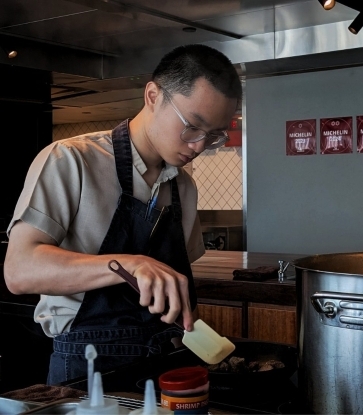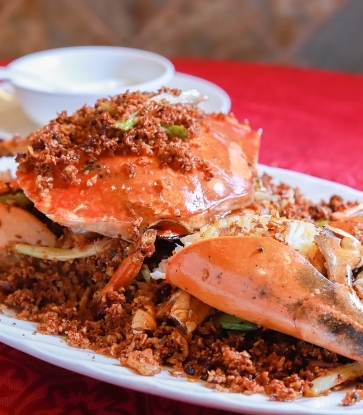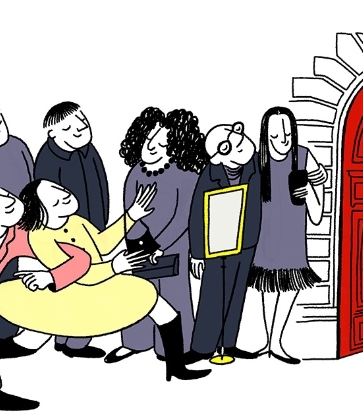
1. The kachang puteh street stall outside Peace Centre
Once a common sight outside cinemas and schools, road-side stalls peddling kacang puteh have gradually disappeared. The last bastion of Singapore’s yesteryear snack culture is a kacang puteh stall outside Peace Centre in Selegie Road. Over the past 14 years, Amirthaalangaram Moorthy has been manning the stall, which is simply known as “Kachang Puteh” (“kacang” refers to nuts and “puteh” or “putih” means white in Malay).
The pushcart is crammed with an eclectic assortment of 20 types of nuts, legumes and crackers that customers can pick and choose to load their paper cones (from $1 for two types of snacks). Popular items include cashew nuts, sugar-coated peanuts, boiled peanuts and chickpeas that are served warm from a steamer. Mr Moorthy, a third-generation kachang puteh seller who hails from Tamil Nadu, fries the various nibbles and coat the peanuts with seasonings such as satay powder and sugar.
His stall operates from Monday to Saturday, from 11am to 8pm. His father used to operate a stall outside Hoover Cinema in Balestier. While the stall receives 300 customers daily — a far cry from its glory days when it used to see much more customers — there are still some who are nuts over kachang puteh.
Long before DIY food became trendy, Hum Jin Pang, a deep-fried dough fritter stall, has been doing it for decades. Customers can fry freshly cut slabs of dough that have been either rolled out with red bean paste or sprinkled with five-spice powder and salt in a wok filled with sputtering oil in front of the stall.
This hands-on practice came about by accident as the stall’s founder was so busy at the stall that customers volunteered to fry their orders. This practice stuck and fry-it-yourself fritters have become the stall’s selling point. Customers can also dust the final product with sugar.
While these bite-sized parcels ($1 for six pieces) can be unctuous (even after being drained after frying), nothing beats the satisfaction of biting into piping hot ham chim peng that practically oozes with oil.

It may be located in a dowdy neighbourhood, but customers only have eyes for its shelves of freshly-baked loaves of bread that are laid out to cool. Sink your teeth into the white pillowy soft bread after trimming off its charred crust.
Besides the regular white and brown loaves, the time-honoured bakery also turns out pastel rainbow-hued bread that are used in ice-cream sandwiches. Don’t forget to slather the spongy loaves with traditional spreads such as kaya and butter.

Stepping into this 44-year-old Cantonese restaurant is like entering going back to the 1960s and 1970s. Matronly waitresses push their dim sum carts around the gaudy carpeted flooring beneath the retro flower motifs on the ceiling. A stage is still intact — a throwback to a bygone era when the 900-seat restaurant was a popular venue for wedding banquets.
Red Star holds a special spot in the history of Singapore’s culinary history — it was started by four well-known chefs, Sin Leong, Hooi Kok Wai, Tham Yui Kai and Lau Yoke Pui. The quartet were dubbed as the Four Heavenly Kings of Singapore’s culinary scene in the 1960s and 1970s.
Forget about settling into the burgundy upholstered chairs if you want your dim sum. Be prepared to jostle with the peckish crowd for your desired bamboo basket (especially during the weekends). It is best to have an idea of what you want as the waitresses, who mostly speak in Mandarin, have no patience to make recommendations or go through the menu.
Hot-sellers include the salted egg custard buns, siew mai, steamed pork ribs, chicken feet, fish meat, fried carrot cake, egg tarts and mango pudding that is served with condensed milk. To help settle the dim sum in your tummy, sip some Chinese tea while you soak up the lively atmosphere.

5. Heap Seng Leong in North Bridge Road
Take a walk down memory lane at Heap Seng Leong, a coffee shop where things have not changed much since it opened in 1974. Flanked on one side of the shop is a weathered wall cabinet that is stocked with bottles of Horlicks and Milo and knick-knacks.
Its counter is lined with rows of red-capped plastic jars that contain biscuits and snacks, as well as a bright orange payphone which requires actual coins to operate. Founder Shi Pong Hsu, who is in his 80s, still brews kopi daily in his singlet and pyjama pants. The dimly-lit coffeeshop is one of the few remaining places that serves kopi gu you (coffee with butter), a creamy robust coffee that has notes of salted caramel.
RELATED: Taste The Past: 6 Retro Cafés To Take You Back In Time



















